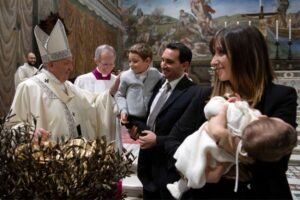
In a groundbreaking maneuver, the Vatican has issued a revolutionary decree broadening the scope of eligibility for Catholic baptism to encompass transgender individuals and infants born to same-sex couples. The pronouncement, sanctioned by Pope Francis, signifies a momentous leap towards fostering inclusivity within the Catholic Church.
Background and Context
The proclamation, disseminated by the Vatican’s doctrinal department, emerges as part of a comprehensive endeavor to tailor Church doctrines to contemporary societal shifts. This action mirrors Pope Francis’s vision for a more encompassing and receptive church, aligning with his recent initiatives to advocate tolerance and comprehension within the Catholic community.
Vatican’s Doctrinal Shift
The declaration, originating from the Vatican’s doctrinal department, denotes a forward-thinking departure from historical norms. The guidelines explicitly affirm that transgender individuals are now eligible to undergo Catholic baptism. This recognition of the spiritual requisites of transgender members represents a profound acceptance within the church. Furthermore, the decision extends to infants born to same-sex couples, addressing a lingering concern within the LGBTQ+ community. The move underscores the Vatican’s acknowledgment of the inherent right of all children, irrespective of their parents’ sexual orientation, to partake in the spiritual sacrament of baptism.
Baptism Guidelines for Transgender Individuals
The novel guidelines explicitly affirm that transgender individuals can now partake in Catholic baptism. This groundbreaking determination enables transgender individuals to wholly engage in the sacraments of the Church, marking a departure from historical norms. The Vatican’s acknowledgment of the right of the transgender community to baptism is a substantial stride towards recognizing the dignity and spirituality of all individuals, regardless of their gender identity.
Inclusion of Offspring from Same-Sex Couples

Equally remarkable is the Vatican’s recognition that offspring born to same-sex couples are eligible for baptism. This measure addresses a longstanding concern within the LGBTQ+ community regarding the Church’s stance on the progeny of same-sex couples. The determination recognizes the fundamental principle that all offspring, regardless of their parents’ sexual orientation, should have access to the spiritual benefits of baptism.
Pope Francis’s Vision of Inclusivity
The document sanctioned by Pope Francis underscores a nuanced and inclusive approach. While affirming the eligibility of transgender individuals and the offspring of same-sex couples for baptism, the guidelines also underscore the significance of individual pastoral prudence in decision-making. This flexibility permits the consideration of specific circumstances, ensuring that the church’s inclusivity is applied with sensitivity and care.
Reactions and Responses
The Vatican’s determination has elicited a spectrum of reactions from within the Church and beyond. Advocates of LGBTQ+ rights within the Catholic community have embraced the decision as a positive stride towards a more inclusive church. Advocacy groups, both within and outside the Church, have commended the Vatican’s acknowledgment of the diverse identities and families present in contemporary society. However, the decision has not been without detractors. Some conservative factions within the Church express apprehension about potential divisions and advocate for a more traditional interpretation of Church doctrine. Striking a delicate balance between progress and tradition remains a challenge for Pope Francis as he navigates the diverse perspectives within the Catholic community.
Implications for the Church’s Stand on LGBTQ+ Issues
The decision to incorporate transgender individuals and offspring of same-sex couples in baptism eligibility reflects a broader shift in the Church’s approach to LGBTQ+ issues. Pope Francis, renowned for his more compassionate stance on matters of sexuality and gender, has consistently emphasized the need for love and acceptance, eschewing judgment. This move follows the Pope’s prior expressions of openness to blessing same-sex unions within the Church. The evolving stance of the Vatican on LGBTQ+ issues under Pope Francis’s leadership signals a desire to adapt Church teachings to the realities of the modern world while upholding the fundamental tenets of Catholicism.
Pastoral Prudence and Individual Circumstances
One noteworthy facet of the Vatican’s guidelines is the emphasis on pastoral prudence in decision-making. While the overarching principle is one of inclusivity, the acknowledgment of individual circumstances allows for a more nuanced application of the guidelines. This approach recognizes the diverse nature of the Catholic community and ensures that decisions concerning baptism are made with a profound understanding of the individuals involved.
Looking Ahead: The Future of Inclusivity in the Catholic Church
The Vatican’s decision to broaden eligibility for baptism marks a milestone in the ongoing discourse about inclusivity within the Catholic Church. As societal attitudes towards gender and sexuality continue to evolve, the Church, under Pope Francis’s leadership, appears resolute in adapting its teachings to reflect these changes. This move may also have broader implications for the church’s relationship with the LGBTQ+ community. While challenges and debates are likely to persist, the Vatican’s willingness to address and adapt to contemporary issues signals a potential path toward greater acceptance and understanding within the Catholic Church.
Conclusion

In summary, the recent decree from the Vatican permitting the baptism of transgender individuals and offspring of same-sex couples signifies a historic shift towards inclusivity within the Catholic Church. Pope Francis’s vision of a more accepting and compassionate church is palpable in these new guidelines, underscoring the significance of recognizing the dignity and spiritual needs of all individuals. As the Church continues to traverse the intricate intersection of tradition and progress, this decision represents a substantial step towards fostering a more inclusive community, harmonized with the evolving realities of the modern world.










